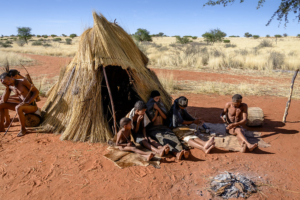Conservation project in Namibia helps fight rural poverty


Namibia was the first country to enshrine the protection of the environment into its constitution, making it a suitable home for the conservation project. Recognizing that effective conservation comprises the ‘preservation of natural habitats, the well-being of wildlife and the empowerment of local communities,’ the N/a’ankuse Foundation targets the reduction of species endangerment whilst fighting the rural poverty that the local San community is facing. As indigenous descendants of the oldest inhabitants of Southern and Eastern Africa, the San have suffered years of ostracism, violence and even genocide, and are subject to the worst effects of the country’s poverty and the HIV/AIDS epidemic.
Health Care Efforts
Through both donations and the project’s flourishing volunteering program, N/a’ankuse has funded the Lifeline Clinic, whose main focus is tackling the poor health outcomes for the San community. Members of the community benefit from annual medical care through clinic-based health care and outreach programs, aided by a 4×4 ambulance, which is helping to combat the persistent discrimination in service provision toward the San as well as their geographic isolation. Bi-weekly nutritional support programs, attended by up to 120 people, provide emergency malnutrition aid as well as education and information regarding health and dietary requirements.
Education
The project has further recognized the importance of education in the fight against rural poverty. An estimated 55.6% of the San population have never received a formal education due to marginalization within public schools, widespread bullying, poor exam results and the giving up of schooling entirely. Yet the N/a’ankuse primary school, established in 2009, directly challenges these barriers to education and the subsequent high illiteracy levels within the community. Recently, Namibia’s Petroleum Training and Education Fund (PETROFUND) provided members of the primary school with the opportunity to attend St. Boniface College in 2024, one of the country’s most acclaimed schools, through the provision of tuition and boarding fees.
The project’s conservation efforts revolve around a holistic approach to both the environment and human life. The primary school creates a safe and welcoming environment for San children, fostering a deep respect for local wildlife. This not only enhances educational outcomes for the children but also encourages the local community to participate in preserving their environment.
The school inspires its students to maintain their vegetable gardens and educates them about conservation efforts. Simultaneously, local community members are employed to support activities like beach clean-ups, anti-poaching initiatives and environmental sustainability projects. In 2020, an agricultural program was established to reinforce nutritional support by providing fresh fruits and vegetables. It also offers training and job opportunities in agricultural and hydroponic techniques for the community.
Such training is essential for the continuity of sustainable farming, ensuring a steady supply of fresh local produce. This helps address malnutrition and improve overall health within the community.
Looking Ahead
The N/a’ankuse project is a remarkable illustration of sustainability and conservation efforts collaboratively addressing rural poverty. By adopting an integrated approach, this initiative has shown that it is possible to uplift both communities and their environment for a brighter future.
– Phoebe Long
Photo: Flickr
